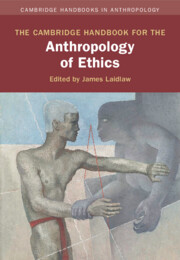Book contents
- The Cambridge Handbook for the Anthropology of Ethics
- Cambridge Handbooks in Anthropology
- The Cambridge Handbook for the Anthropology of Ethics
- Copyright page
- Contents
- Contributors
- 1 Introduction
- Part I Intellectual Sources and Disciplinary Engagements
- Part II Aspects of Ethical Agency
- Part III Media and Modes of Ethical Practice
- Part IV Intimate and Everyday Life
- 22 Care
- 23 Kinship and Love
- 24 Cooperation and Punishment
- 25 Favours
- 26 The Inimical Gaze
- 27 Animals and More-Than-Representational Ethics
- 28 God
- Part V Institutional Life
- Index
- References
28 - God
from Part IV - Intimate and Everyday Life
Published online by Cambridge University Press: 11 May 2023
- The Cambridge Handbook for the Anthropology of Ethics
- Cambridge Handbooks in Anthropology
- The Cambridge Handbook for the Anthropology of Ethics
- Copyright page
- Contents
- Contributors
- 1 Introduction
- Part I Intellectual Sources and Disciplinary Engagements
- Part II Aspects of Ethical Agency
- Part III Media and Modes of Ethical Practice
- Part IV Intimate and Everyday Life
- 22 Care
- 23 Kinship and Love
- 24 Cooperation and Punishment
- 25 Favours
- 26 The Inimical Gaze
- 27 Animals and More-Than-Representational Ethics
- 28 God
- Part V Institutional Life
- Index
- References
Summary
When we think about faith as a relationship with god, rather than a set of propositional beliefs, this changes the way we think about ethics. We think about ethics more as a set of practices and orientations than as rules. The chapter considers this claim through examining the way evangelical Christians come to understand their relationship with Jesus, and more briefly through Catholics who seek to understand what it is to be a modern Mexican, through Amazonian shamans who want to know their spirits, and modern magicians. When we focus on religion as something people do, rather than just what they believe, we must approach ethics as a series of incremental interpretations of how people make sense of who they have become in the world, rather than a carefully considered set of logical arguments.
- Type
- Chapter
- Information
- The Cambridge Handbook for the Anthropology of Ethics , pp. 706 - 728Publisher: Cambridge University PressPrint publication year: 2023

